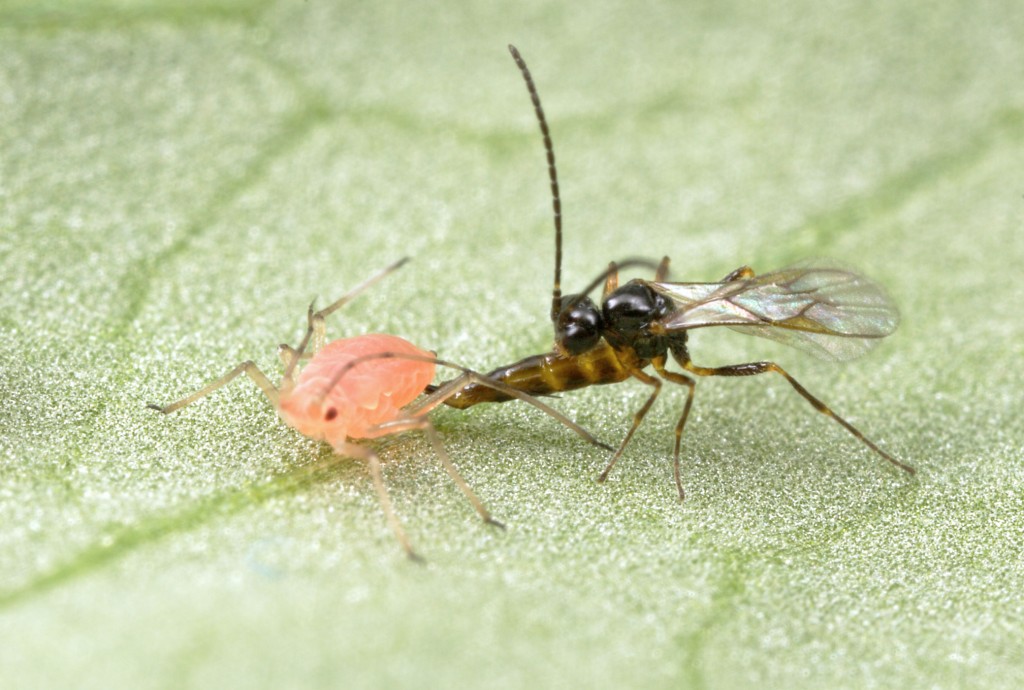Four Reasons why Biocontrol Should be Important to All of Us
Are you thinking going organic? Let’s talk about “Biological Pest Control”

Biological Pest Control. A parasatoid wasp lays an egg in an aphid. Photo by Alex Wild, University of Georgia.
Since USDA’s Agricultural Marketing Service (AMS) implemented the organic regulations in 2002, the U.S. organic sector has tripled in size to over 22,000 certified organic operations with over $43 billion in 2015 in U.S. retail sales, and over $75 billion worldwide according to data released by the Agricultural Marketing Service’s (AMS) National Organic Program (NOP).
Some projections for the future include: the Global Organic Food Market is expected to grow at over 16% by 2020, according to TechSci Research, and the “Health and Wellness” industry will reach the record value of $1 trillion in 2017, according to Euromonitor International.
Demand for organic products is expected to continue growing. This strong consumer demand outruns supply, providing market opportunities within the organic sector.
One of the primary reasons the Organic ‘movement’ evolved was to eliminate synthetic plant protection materials and pesticides. The use of “Biological Pest Control” arrived on the scene in the 1970’s as a way to reduce pesticide use and complement Integrated Pest Management programs.
According to Wikipedia “Biological control of pests and diseases is a method of controlling pests and diseases in agriculture that relies on natural predation rather than introduced chemicals.”
Now, let’s take for example Kenya. The country is a regional leader in biological pest control, but earning this distinction did not come easily. In 2013 the country exported to the European Union $355m (£250m) of agricultural products, but the EU has increasingly banned or limited the use of chemical pesticides. Kenyan Agriculture was against the ropes, so they had to call the ‘cavalry’, also known as, the good bugs.
It is known that crisis and opportunity are two sides of the same coin, so Kenya’s farmers had to adapt in order to continue selling their produce in Europe. As a result, the country has been relying more and more on biological pest control to ensure that its agricultural exports to Europe maintain their best possible condition, regardless of the crop, from vegetables to flowers.
This increase in regulation has led to the explosion of the growing, multi-million dollar global industry known as Biological Pest Control.
“All we are saying, is give nature a chance”
For another example let’s take a scholar in Israel, Shimon Steinberg, from his TEDx Conference in Tel Aviv, 2010, you can tell his love and dedication for research and teaching about biocontrol with “good bugs”, he claims there are three very important reasons for doing biocontrol:
“The first reason”, states Steinberg passionately, “is safety, with respect to the application. This is the number one answer that we get from growers. Now they can see grandparents with their grandchildren, distributing the natural enemies, instead of wearing special clothes and gas masks and applying chemicals”. It should be noted that some biologicals do require worker protection, such as sprays with Bt (bacillus thuringensis), a live bacteria that naturally controls lepidopteran insects like European Corn Borer.
Number two, many growers fear the possibility of resistance, as it has happened already with malaria-transmitting mosquitoes for an instance, pests will become resistant to the chemicals, and it can happen very quickly. Fortunately, in biological control as in natural control resistance is extremely rare. Mainly because many of the controls and populations already exist in nature..we’re just introducing or encouraging more of them to step up to their cumulative task.
The third reason is public and political demand, says Steinberg, “the more the public demands the reduction of chemicals, the more growers become aware of the fact they should, wherever they can and wherever possible, replace the chemical control with biological control.”
In support of these three points emphasized by professor Steinberg, we’d like add a fourth here, as we mentioned when citing the case of Kenya, is “government regulations”, which is really an extension of his third point. Authorities in the EU and around the world have in recent decades increasingly clamped down on the usage of synthetic chemicals, and just as in Kenya, the countries that are exporting fruits, greens, and even flowers don’t want to lose their share of important markets like the EU and the USA.
Even ornamentals plants with residues of pesticides are being prohibited by some countries, which has opened the door to some companies like Koppert Biological Systems, which presented on September 30 in Iberflora, Valencia in Spain. They focus on pollination and biological pest control with no pesticides and no chemicals. This trend is facilitating the opening of markets for products, in this case flowers, and at the same time helping to protect the health of workers in nurseries who are no longer exposed to dangerous chemicals.
In Almería, Spain, for example, in 2005, only 120 ha were dedicated to biological control. In 2014, 26.000 ha are using the biological control techniques. This demonstrates the rapidly growing demand of European markets to organic produce.
If you think in this article there is an opportunity for your harvest, or your friends’ harvest, and you liked it, please help us share the word on Facebook
To read more:
https://www.bbc.com/news/business-35968192
https://blogs.usda.gov/2016/11/10/growth-and-opportunity-in-the-organic-sector/
https://iberflora.feriavalencia.com/en/
https://www.koppert.es/noticias/koppert-revelara-en-iberflora-nuevas-estrategias-de-produccion-sostenible-en-plantas-ornamentales/
https://www.usda.gov/wps/portal/usda/usdahome?contentid=2016/04/0084.xml
https://www.cnbc.com/2016/05/05/the-whole-foods-economy-sparks-organic-food-start-ups.html
https://news.uga.edu/releases/article/uga-study-sheds-light-on-aphid-vs-wasp-evolution/



